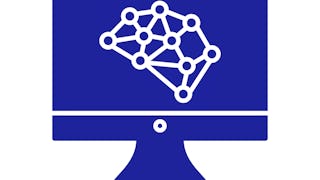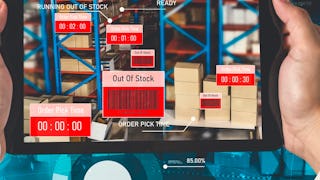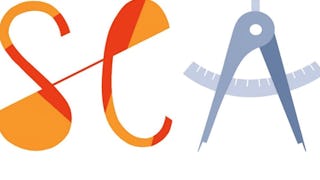This course will teach you how to leverage the power of Python to understand complicated supply chain datasets. Even if you are not familiar with supply chain fundamentals, the rich data sets that we will use as a canvas will help orient you with several Pythonic tools and best practices for exploratory data analysis (EDA). As such, though all datasets are geared towards supply chain minded professionals, the lessons are easily generalizable to other use cases.

Gain next-level skills with Coursera Plus for $199 (regularly $399). Save now.

Fundamentals of Machine Learning for Supply Chain
This course is part of Machine Learning for Supply Chains Specialization


Instructors: Rajvir Dua
4,408 already enrolled
Included with
(40 reviews)
Recommended experience
What you'll learn
Learn to merge, clean, and manipulate data using Python libraries such as Numpy and Pandas
Gain familiarity with the basic and advaned Python functonalities such as importing and using modules, list compreohensions, and lambda functions.
Solve a supply chain cost optimization problem using Linear Programming with Pulp
Skills you'll gain
- Pandas (Python Package)
- Exploratory Data Analysis
- Data Structures
- Data Wrangling
- Data Manipulation
- Data Transformation
- Operations Research
- Plot (Graphics)
- Data Preprocessing
- Pivot Tables And Charts
- Data Cleansing
- Python Programming
- Supply Chain
- Applied Machine Learning
- Scripting
- Data Analysis
- NumPy
- Jupyter
- Programming Principles
- Data Science
Details to know

Add to your LinkedIn profile
8 assignments
See how employees at top companies are mastering in-demand skills

Build your subject-matter expertise
- Learn new concepts from industry experts
- Gain a foundational understanding of a subject or tool
- Develop job-relevant skills with hands-on projects
- Earn a shareable career certificate

There are 4 modules in this course
Welcome to the course! In this first module, we’ll learn about the fundamentals of programming and Python. We’ll start with basic data structures, functions, and loops and then some time becoming familiar with importing modules and libraries. Finally, we'll put our new skills to the test by optimizing a supply constraint problem using linear programming techniques.
What's included
12 videos5 readings3 assignments4 programming assignments1 discussion prompt5 ungraded labs
In this next module, we'll dive into the most common tools used for data science: Python, and Numpy. We'll start with Numpy, getting used to np arrays and their main functionality. After getting familiar with loading in data of all types, we'll learn about some basic data description and cleaning techniques. We'll also learn to work with indexes and columns in Dataframes. We'll end with an introduction to plotting and summary statistics. We will use common supply chain data sets for our explorations
What's included
9 videos3 readings3 assignments1 programming assignment1 discussion prompt2 ungraded labs
In this third module, we'll take our Pandas and Numpy skills to the next level, learning how to effectively combine and reshape data. We'll learn how to reshape data to fit with our needs through merges and pivots. This setup will help us tackle common data preprocessing steps necessary to run machine learning algorithms, such as one-hot encoding. Finally, we'll encounter the most important tools in our Pandas arsenal (Groupby-Apply-Transform) and explore its transformative functionality.
What's included
5 videos3 readings1 assignment1 programming assignment1 discussion prompt2 ungraded labs
In this final project, we'll take collection of various data sets involving warehouse capacities, product demand, and freight rates to optimize cost of producing and shipping products.
What's included
2 videos1 assignment1 programming assignment1 ungraded lab
Earn a career certificate
Add this credential to your LinkedIn profile, resume, or CV. Share it on social media and in your performance review.
Offered by
Explore more from Data Analysis
 Status: Free Trial
Status: Free Trial Status: Free Trial
Status: Free Trial Status: Free Trial
Status: Free TrialRutgers the State University of New Jersey
 Status: Free Trial
Status: Free TrialRutgers the State University of New Jersey
Why people choose Coursera for their career




Learner reviews
40 reviews
- 5 stars
40%
- 4 stars
27.50%
- 3 stars
10%
- 2 stars
7.50%
- 1 star
15%
Showing 3 of 40
Reviewed on Nov 10, 2024
Good. Improvement in UI interface and lab should be improved
Reviewed on Jan 24, 2024
love the progression from "key" basics and hands on problems
Frequently asked questions
To access the course materials, assignments and to earn a Certificate, you will need to purchase the Certificate experience when you enroll in a course. You can try a Free Trial instead, or apply for Financial Aid. The course may offer 'Full Course, No Certificate' instead. This option lets you see all course materials, submit required assessments, and get a final grade. This also means that you will not be able to purchase a Certificate experience.
When you enroll in the course, you get access to all of the courses in the Specialization, and you earn a certificate when you complete the work. Your electronic Certificate will be added to your Accomplishments page - from there, you can print your Certificate or add it to your LinkedIn profile.
Yes. In select learning programs, you can apply for financial aid or a scholarship if you can’t afford the enrollment fee. If fin aid or scholarship is available for your learning program selection, you’ll find a link to apply on the description page.
More questions
Financial aid available,





